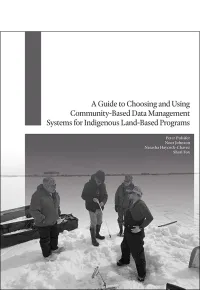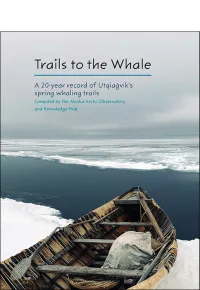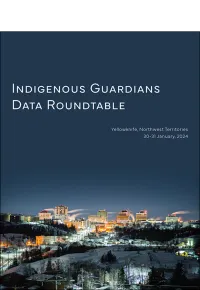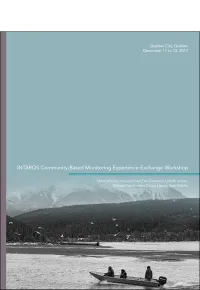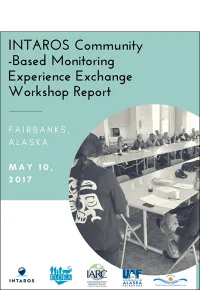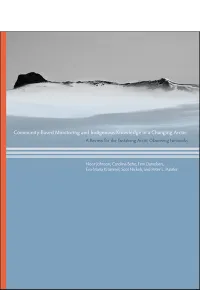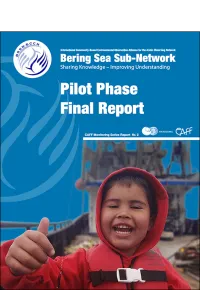Reports & Publications
Reports & Publications
Report
A Guide to Choosing and Using Community-Based Data Management Systems for Indigenous Land-Based Programs | 2025
Pulsifer, P., N. Johnson, N. Haycock-Chavez, and S. Fox. 2025. A Guide to Choosing and Using Community-Based Data Management Systems for Indigenous Land-Based Programs. Geomatics and Cartographic Research Centre at Carleton University and Exchange For Local Observations and Knowledge of The Arctic. University of Colorado Boulder. Boulder, CO, doi.org/10.7265/eqsc-fb29. (41 pg.)
The guide will be accompanied by an interactive online tool (planned for release in early 2026) to help programs explore and choose the right technologies for their needs. The address for the tool will be posted here when available.
Trails to the Whale: A 20-Year Record of Utqiaġvik's Spring Whaling Trails | 2024
Alaska Arctic Observatory and Knowledge Hub (AAOKH). 2024. Trails to the Whale: A 20-year record of Utqiaġvik’s spring whaling trails. Edited and compiled by Matthew L. Druckenmiller, Joshua Jones, Roberta Tuurraq Glenn-Borade, Kimberly Kivvaq Pikok, and Donna D. W. Hauser. Report for the Barrow Whaling Captain’s Association. Fairbanks, Alaska, doi:10.7265/3PZV-6906. (21 pg.)
Indigenous Guardians Data Roundtable Report | 2024
Northern Indigenous Stewardship Circle, Geomatics and Cartographic Research Centre at Carleton University, and Exchange For Local Observations and Knowledge of The Arctic. 2024. Indigenous Guardians Data Roundtable Report. Yellowknife, Northwest Territories, Canada, January 30-31, 2024. Northern Indigenous Stewardship Circle. doi:10.7265/MT5Q-7084.
INTAROS Community-Based Monitoring Experience Exchange Workshop | 2018
Johnson, N., M. Fidel, F. Danielsen, L. Iversen, M. K. Poulsen, D. Hauser, and P. Pulsifer. 2018. INTAROS Community-Based Monitoring Experience Exchange Workshop Report: Canada. Workshop organized as a contribution to INTAROS, December 11-12, 2017. Exchange for Local Observations and Knowledge of the Arctic (ELOKA), Nordic Foundation for Development and Ecology (NORDECO), Yukon River Inter-Tribal Watershed Council (YRITWC), International Arctic Research Center (IARC) at University of Alaska Fairbanks (UAF), and Integrated Arctic Observation System (INTAROS). Québec City, Québec. (27 pg.)
INTAROS Community-Based Monitoring Experience Exchange Workshop Report | 2017
Fidel, M., N. Johnson, F. Danielsen, H. Eicken, L. Iversen, O. Lee, and C. Strawhacker. 2017. INTAROS Community-based Monitoring Experience Exchange Workshop Report. Yukon River Inter-Tribal Watershed Council (YRITWC), University of Alaska Fairbanks, Exchange for Local Observations and Knowledge of the Arctic (ELOKA), and INTAROS: Fairbanks, Alaska.
Community-Based Monitoring and Indigenous Knowledge in a Changing Arctic Report | 2016
Johnson, N., C. Behe, F. Danielsen, E.-M. Krümmel, S. Nickels, and P. Pulsifer. 2016. Community-Based Monitoring and Indigenous Knowledge in a Changing Arctic: A Review of the Sustaining Arctic Observing Networks. Inuit Circumpolar Council (ICC), Brown University, the Exchange for Local Knowledge and Observations of the Arctic (ELOKA), and Inuit Qaujisarvingat: Inuit Knowledge Centre of Inuit Tapiriit Kanatami (ITK). Ottawa, Ontario. (62 pg.)
Greenlandic Perspectives on Climate Change 2018 to 2019
The Greenlandic Perspectives on Climate Change Survey report provides the first national estimates of residents’ climate change beliefs, experiences, risk-opportunity perceptions and emotional responses, as well as views on recent sea ice changes, glacial changes, climate change impacts, societal adaptation, and climate and environment policy preferences.
From July 2018 to January 2019, an international team of Greenlandic, American, Swedish and Danish researchers from the University of Greenland, University of Copenhagen, Greenland Perspective and Kraks Fond Institute for Urban Research conducted the first Greenlandic Perspectives Survey (GPS), a nationally representative survey of Greenlandic residents’ views about environmental changes and Greenland’s future. In partnership with Statistics Greenland, surveys were randomly allocated to residents living in randomly selected towns and settlements across Greenland’s municipalities and geographic regions, as well as the self-representing locations of Nuuk and Upernavik. 646 residents in Greenland (~1.5 percent of the adult population) took the survey from July 2018 to January 2019. The margin of error is +/- 3 percent at the 95 percent confidence level. Additionally, filmed interviews were conducted in each location.
Greenlandic Perspectives on Climate Change: Two Short Films
Language: Greenlandic (and a little Danish)
Subtitle Options: Danish OR English
Film 1: (6:14)
Film 2: (5:24)
For more information, please contact:
Traditional Knowledge Reports on Marine Mammals
These reports, compiled from a series of related projects, are based on interviews held between 2007 and 2017 with Alaska Native hunters in coastal communities. The reports focus on marine mammals, with emphasis on changes in particular species during the decade of the conducted interviews. This collection is unusual in that it spans both a decade and a large geographic range of communities. The reports, as well as the results of the projects, were also presented in two peer-reviewed papers in scientific journals:
Huntington, H.P., L.T. Quakenbush, and M. Nelson. 2017. Evaluating the effects of climate change on Indigenous marine mammal hunting in northern and western Alaska using traditional knowledge. Frontiers in Marine Science 4:319. DOI: 10.3389/fmars.2017.00319.
Huntington, H.P., L.T. Quakenbush, and M. Nelson. 2016. Effects of changing sea ice on marine mammals and subsistence hunters in northern Alaska from traditional knowledge interviews. Biology Letters 12: 20160198. DOI: 10.1098/rsbl.2016.0198.
Bering Sea Sub-Network Pilot Phase Final Report
This Summary Report of Community-Based Environmental and Species Observations from the Bering Sea Sub-Network, 2008-2009 as created by the BSSN. The Bering Sea Sub-Network (BSSN) is comprised of a set of coastal communities representing six indigenous cultures: three in the Russian Federation and three in the United States. The objective of BSSN is to develop a framework that will enable residents in remote Arctic communities to systematically document physical and social changes occurring in their region. In 2008 and 2009, approximately 300 hunters and fishermen participated in a pilot project of harvest surveys covering species caught, species health, and intended use; changing climate and environmental conditions; location and travel information; and a review of harvest conditions.
Survey Data of Community-Based Environmental and Species Observations from the Bering Sea Sub-Network, 2008-2009: To submit a request for access to this restricted survey data, please contact us.
Publications
2021
Journal Articles
Eicken, H., F. Danielsen, J.-M. Sam, M. Fidel, N. Johnson, M. K. Poulsen, O. A. Lee, K. V. Spellman, L. Iversen, P. Pulsifer, and M. Enghoff. 2021. Connecting Top-Down and Bottom-Up Approaches in Environmental Observing, BioScience, 71(5) :467–483, doi:10.1093/biosci/biab018.
Johnson N., M. L. Druckenmiller, F. Danielsen, and P. L. Pulsifer. 2021. The use of digital platforms for community-based monitoring. BioScience, 71(5): 452-466, doi:10.1093/biosci/biaa162.
Book Chapters
Johnson, N., C. Strawhacker, and P. Pulsifer. 2021 (In Review). Data infrastructures, Indigenous Knowledge, and environmental observing in the Arctic. In J. Goldstein and E. Nost, Eds. The Nature of Data: Infrastructures, Environments, Politics. Lincoln: University of Nebraska Press.
Books
Danielsen, F., N. Johnson, O. Lee, M. Fidel, L. Iversen, M. K. Poulsen, H. Eicken, A. Albin, S. G. Hansen, P. L. Pulsifer, P. Thorne, and M. Enghoff. 2021. Community-based monitoring programs in the Arctic: capabilities, good practices, and challenges. Fairbanks: University of Alaska Press.
2020
Journal Articles
Hauser, D. D. W, J. Jones, R. P. Schaeffer, B. Adams, M. L. Druckenmiller, R. T. Glenn, E. B. Sparrow, and H. Eicken. 2020. Tracking Alaskan arctic changes through a collaborative network of coastal Indigenous Communities. Witness Community Highlights, 27 April 2020 Issue, https://www.arcus.org/witness-the-arctic/2020/4/highlight/1.
Loseto, L. L., K. Breton-Honeyman, D. N. Etiendem, N. Johnson, T. Pearce, et al. 2020. Indigenous participation in peer review publications and the editorial process: reflections from a workshop. Arctic Science. 6(3): 352-360. doi:10.1139/as-2020-0023.
Johnson, N. 2020. Review essay: Two views of Arctic sea ice. Journal for the Study of Religion, Nature, and Culture. 13(3): 373-377. doi:10.1558/jsrnc.37140.
Johnson, N., T. Pearce, K. Breton-Honeyman, D. N. Etiendem, and L. L. Loseto. 2020. Knowledge co-production and co-management of Arctic wildlife. Arctic Science. 6(3): 124-126, doi:10.1139/as-2020-0028.
Book Chapters
Druckenmiller, M. L., H. Eicken, J. C. George, and L. Brower. 2010. Assessing the shorefast ice: Iñupiat whaling trails off Barrow, Alaska. In I. Krupnik et al., Eds. SIKU: Knowing Our Ice. Springer-Verlag, New York, pp. 202-228.
Raymond-Yakoubian, J., P. L. Pulsifer, D. R. F. Taylor, C. Brattland, and T. Mustonen. 2020. Mapping and Indigenous Peoples in the Arctic. In Young O, P. Berkman, A. Vylegzhanin, Eds. Governing Arctic Seas: Regional Lessons from the Being Straight and Barents Sea. Springer, pp 293-319. doi:10.1007/978-3-030-25674-6_13.
Books
Danielsen, F. (Ed.), N. Johnson, O. Lee, M. Fidel, L. Iversen, M. K. Poulsen, and H. Eicken. 2020. Community-Based Monitoring in the Arctic. Fairbanks: University of Alaska Press.
2019
Journal Articles
Druckenmiller, M. L., O. Lee, H. Eicken. R. Thoman. 2019. Bering Sea conditions during the sea ice for walrus outlook (SIWO) 2019 season. Witness the Arctic. Spring 2019, Issue 1, https://www.arcus.org/witness-the-arctic/2019/1/article/29394.
Jäger, M. B., D. B Ferguson, O. Huntington, M. K. Johnson, N. Johnson, A. Juan, S. Larson, P. Pulsifer, T. Reader, C. Strawhacker, A. Walker, D. Whiting, J. Wilson, J. Yazzie, and S. R. Carroll. 2019. Building an Indigenous foods knowledges network through relational accountability. Journal of Agriculture, Food Systems, and Community Development, 9(B):45-51. doi:10.5304/jafscd.2019.09B.005.
Other Publications
Slats, R., C. Oliver, R. Bahnke, H. Bell, A. Miller, D. Pungowiyi, J. Merculief, N. Menadelook Sr., J. Ivanoff, and C. Oxereok. 2019. M. L. Druckenmiller, R. Daniel, and M. Johnson, Eds. Voices from the front lines of a changing Bering Sea. Arctic Report Card 2019, J. Richter-Menge, M. L. Druckenmiller, and M. Jeffries, Eds., http://www.arctic.noaa.gov/Report-Card.
2018
Journal Articles
Robards, M., H. Huntington, M. L. Druckenmiller, J. Lefevre, S. Moses, Z. Stevenson, A. Watson, and M. Williams. 2018. Understanding and adapting to observed changes in the Alaskan Arctic: actionable knowledge co-production with Alaska Native Communities. Deep Sea Research II, Special Issue on the Synthesis of Arctic Research.
2016
Book Chapters
McCann, H., C. Behe, and P. Pulsifer. 2016. Sharing and preserving Indigenous Knowledge using information and communications technology: opportunities, challenges and the way forward. In Indigenous Ownership & Libraries, Archives, and Museums monograph.
2015
Journal Articles
Duerr, R. E., J. McCusker, M. A. Parsons, S. S. Khalsa, P. L. Pulsifer, C. Thompson, R .Yan, D. L. McGuinness, and P. Fox. 2015. Formalizing the semantics of sea ice. Earth Science Informatics. 8(1): 51-62. doi:10.1007/s12145-014-0177-z.
Johnson, N., L. Alessa, C. Behe, F. Danielsen, S. Gearheard, V. Gofman-Wallingford, A. Kliskey, E. M. Krummel, A. Lynch, T. Mustonen, P. Pulsifer, and M. Svoboda. 2015. The contributions of community-based monitoring and Traditional Knowledge to arctic observing networks: reflections on the state of the field. Arctic. 68, Suppl. 1:1-13. doi:10.14430/arctic4447.
2014
Journal Articles
Eicken, H., M. Kaufman, I. Krupnik, P. Pulsifer, L. Apangalook, P. Apangalook, W. Weyapuk, Leavitt, J. 2014. A framework and database for community sea ice observations in a changing Arctic: an Alaskan prototype for multiple users. Polar Geography 37(1): 5–27. doi:10.1080/1088937X.2013.873090.
2012
Journal Articles
Pulsifer, P., S. Gearheard, H. P. Huntington, M. A. Parsons, C. McNeave, and H. S. McCann. 2012. The role of data management in engaging communities in Arctic research: overview of the Exchange for Local Observations and Knowledge of the Arctic (ELOKA). Polar Geography, 35: 271–290.
Books
Weyapuk, Jr. W., and I. Krupnik, compilers. H. Anungazuk, I. Krupnik, and M.L. Druckenmiller, editors/contributors. 2012. Kifikmi Sigum Qanuq Ilitaavut – Wales Iñupiaq Sea-Ice Dictionary. Arctic Studies Center, Smithsonian Institution, Washington, D.C., 112 p.
2009
Journal Articles
Eicken, H., A. Lovecraft, and M. L. Druckenmiller. 2009. Sea-ice system services: a framework to help identify and meet information needs relevant for arctic observing networks. Arctic, 62(2): 119-136.
Book Chapters
Huntington, H. P., S. Gearheard, M. L. Druckenmiller, and A. Mahoney. 2009. Community-based observation programs and Indigenous and local sea-ice knowledge. In H. Eicken et al., Eds. Field Techniques for Sea-Ice Research. University of Alaska Press, Fairbanks, AK, pp. 345-364.
